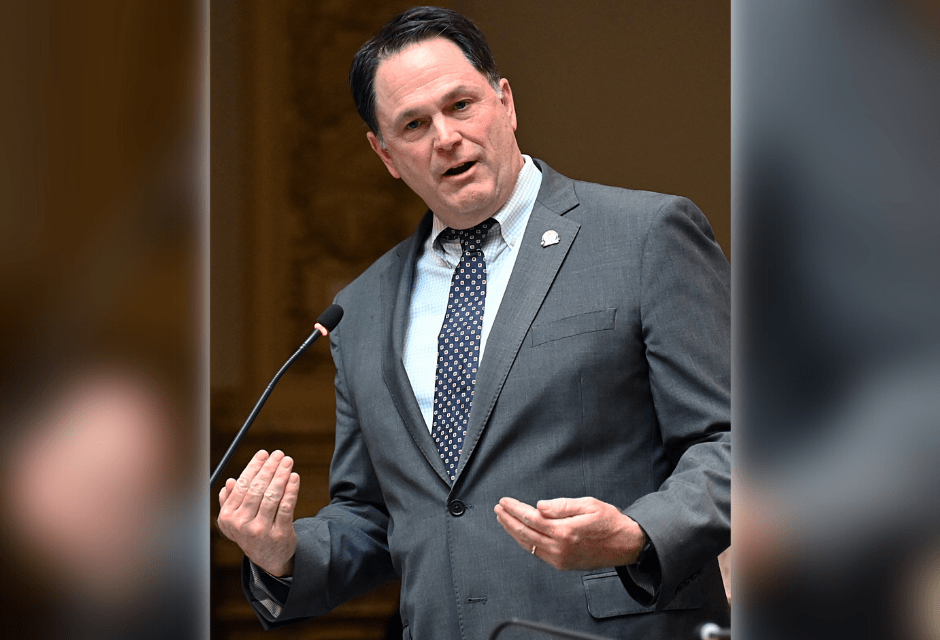
Sen. Jason Howell, R-Murray, presents Senate Bill 5, which seeks to create a multi-pronged process to resolve obscenity complaints in public schools.
FRANKFORT — The Kentucky Senate approved a bill Thursday that calls on local school boards to create a new, multi-pronged process for resolving objections over explicit materials in public schools.
The measure — Senate Bill 5 — advanced off the Senate floor with a 29-4 vote after nearly an hour of ardent debate and now heads to the House for consideration. The bill moved out of committee following similar deliberations earlier in the day.
Sen. Jason Howell, R-Murray, is sponsoring the bill. He told lawmakers on the Senate floor that it would help ensure parental involvement in materials, events and programs that affect their child’s education.
“They need to be able to have a voice when those items are in conflict with their family’s values and beliefs,” Howell said. “This bill defines a process for a parent to lodge a complaint, to challenge material that they believe is harmful to minors or otherwise inappropriate to be in school.”
The legislation would require local school boards to adopt a complaint resolution policy by July 1. It spells out a school principal’s responsibilities to investigate the allegations, determine if the material is harmful to minors, and decide if it should remain available. The principal must reply to parents within 10 business days in most cases.
Parents would have the right to appeal a principal’s decision directly to the school board. The board must then perform an administrative review, and address the issue in an open meeting that allows public comment. If parents disagree with the school board’s decision, they may opt their children out of accessing the material or the event.
SB 5 also directs the Kentucky Department of Education to adopt a model policy for school boards by May 1. Another section seeks to define content that could be deemed harmful to minors.
“This bill brings clarity, consistency and accountability to the process,” Howell said. “The goal of this bill is to allow the greatest flexibility possible in evaluating material under local values and norms all across the many diverse communities in our commonwealth.”
Opponents of the bill raised concerns on both the floor and in committee, including Kate Miller, advocacy director of the ACLU of Kentucky. She called it state-sponsored censorship, and said limiting access to books inhibits the training of young people to think for themselves.
Senate Minority Caucus Chair Reginald Thomas, D-Lexington, called the measure a book-banning bill. He questioned how schools would teach about important topics — like lynching that involved the castration of Black males — or show historical photos from the Holocaust that might include nudity.
“That’s what education is — allowing individual people to read, and be exposed to, and see and learn all different subject matter so that individual can have an understanding …and critically think and analyze about those different subjects,” he said.
Another critic, Sen. David Yates, D-Louisville, agreed that some subjects are too heavy for young ages, but raised concerns that the bill would apply to all grade levels. He said his constituents don’t want big government telling them what they can and can’t read.
“Education is the way,” he said. “It removes the racism, the homophobia, the sexism. Education is the great denominator that moves us forward, and we have to be really, really careful as we limit that.”
Supporters of SB 5 challenged many of the comments.
“This is not book banning,” said Sen. Lindsey Tichenor, R-Smithfield. “This is putting in precautions to protect children from desensitizing them to sexual content.”
Tichenor said some of the books in question include pedophilia, and she asked her colleagues where society should draw the line on materials for children.
A few supporters said some of the disputed content is too obscene to be read aloud in the chamber or in school board meetings.
Sen. Stephen Meredith, R-Leitchfield, said Howell was just trying to create due process for parents to raise objections.
“All he has done has put a mechanism in place to ensure that parents can have a voice in the education of their children,” Meredith said. “To suggest otherwise is totally irresponsible and uncalled for. When are we going to let children be children?”




